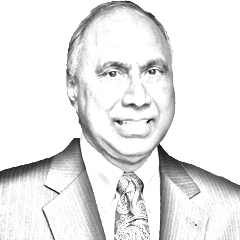As a Muslim of South Asian origin residing in the United States, I am continually struck by the profound and transformative power of Ramadan. This sacred month fosters deep spiritual renewal, self-discipline, and communal solidarity.
The essence of this spiritual renewal culminates in Eid ul-Fitr. Eid is a time for families and communities to come together and express gratitude for the blessings bestowed upon them. It is also an occasion for communal commitment and collective joy.
The practice of Zakat al-Fitr, a mandatory charitable contribution given before Eid prayers, serves as a tangible manifestation of communal commitment. It ensures that even the most vulnerable members of society are cared for and benefit from this celebration.
In my humble opinion, there are important lessons to be learned from Ramadan and Eid ul-Fitr that should apply beyond this holy month and our Muslim religion. True joy is incomplete if it is not shared. We should have a collective responsibility to ensure that the joy of Eid is experienced by others, particularly those who are often marginalized and overlooked.
The concept of sacrifice and charity, intrinsic to Ramadan, should not be limited to Zakat al-Fitr. It should be an invitation to uplift others, to share our resources and time to improve the lives of those around us. This includes reaching out to orphans, refugees, and those living in poverty, ensuring they are not excluded. Simple acts of kindness, such as sharing meals, providing gifts, or offering words of comfort, can make a profound difference in their lives.
The practice of Zakat al-Fitr, a mandatory charitable contribution given before Eid prayers, serves as a tangible manifestation of communal commitment.
The spirit of Ramadan, with its emphasis on charity and empathy, should resonate beyond the confines of the Muslim community. In a world grappling with conflicts, poverty, and displacement, the lessons of Ramadan are more relevant than ever. The humanitarian crises unfolding across the globe demand a collective response, a global outpouring of compassion and generosity.
Eid’s message of hope and generosity should not be limited to one community; it is a universal reminder that human kindness knows no borders. We are all interconnected, bound by our shared humanity. The challenges faced by one community affect us all. Therefore, we should extend our hands in solidarity, offering support and assistance to those in need, irrespective of their background or location.
The spirit of Ramadan should not be confined to a single month; it should become a lifelong commitment. We should strive to integrate the values of charity, sacrifice, and empathy into our daily lives, making them an integral part of our character. By doing so, we can transform our communities and contribute to building a more compassionate and just world.
As in the past, I invite others to participate in local and global initiatives that empower communities long after our fasting month ends. By supporting organizations that provide education, healthcare, and economic opportunities, we can help create sustainable solutions to address the root causes of poverty and inequality.
As always, I urge those with the capacity for substantial charitable contributions to prioritize targeted philanthropic initiatives that foster strategic social and economic transformation. Let us employ the spirit of Ramadan to build a legacy of compassion, charity, and joy that echoes throughout the year, reaching every corner of our shared humanity.
The writer is an entrepreneur, civic leader, and thought leader based in Washington D.C. The views expressed here are personal.
